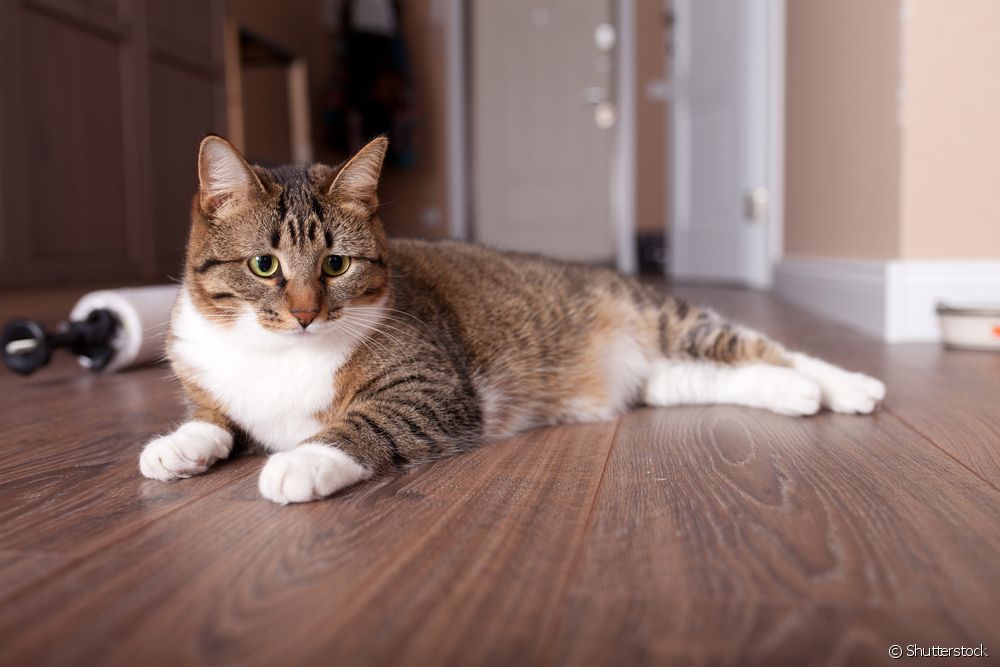Feline FIP: veterinarian unravels all the features of the disease

Table of contents
Do you know what feline FIP is? Feline Infectious Peritonitis is an extremely dangerous viral disease that can affect the kitten. Cats infected with feline FIP have a weakened organism and may develop other health problems. Unfortunately, in many cases the animal does not survive. Because it is one of the most serious diseases that can affect felines, it is important to understand more about FIP.We spoke to Erica Baffa, a postgraduate veterinary surgeon in feline medicine, to explain exactly what feline peritonitis is, what types of FIP disease in cats are, their symptoms and how it is possible to improve the quality of life of an infected animal. Check it out!
What is FIP? Viral cat disease is considered to be one of the most serious diseases there is
Feline FIP is a severe infectious disease caused by a type of coronavirus. "FIP is known as Feline Infectious Peritonitis and occurs mainly in young patients with immature immunity concomitant with stressful events," explains Erica. Coronaviruses have in their genetic material a single-stranded RNA with a high capacity for mutation. FIP disease is caused by the modifications of the coronavirus."The feline enteric coronavirus has a sequence of approximately 11 genes. The FIP virus happens when there is an alteration in one of these genes, which somehow makes the pathogenesis happen," he explains. Transmission happens from a cat with FIP to a healthy one, usually through contact with feces from infected animals, contaminated environments and shared objects.It is worth noting that the coronavirus that causes FIP is not the same as the one that affects humans and is not related to the virus that causes Covid-19.
Feline FIP can be divided into dry FIP and wet FIP
FIP disease in cats can manifest itself in two ways: dry FIP or effusive FIP, also called wet FIP. In dry feline FIP, inflammatory formations appear in highly vascularized organs. "It tends to be less aggressive and is characterized by the presence of granulomas in the mesenteric region, in the intestine, spleen, liver and other organs. It has the characteristic of acting by lymphatic route ","Effusive or wet FIP is characterized mainly by the accumulation of cavitary fluids, generating vasculitis. It tends to be more aggressive when compared to non-effusive FIP, in addition to acting via blood, forming immunocomplexes", explains Erica.
Feline Pif: symptoms of the disease are often very varied
When infected with FIP, cats show some symptoms that help to identify the disease. However, it is a silent disease. Erica explains that clinical signs are very nonspecific and can vary. In feline FIP, the most common symptoms are: "recurrent high fever, effusions and edema in the case of wet feline FIP, mesenteric lymphadenopathy (inflammation of the nodes), anorexia, lossprogressive weight gain, dehydration, jaundice, diarrhea, thickening of the intestinal loops and dyspnea (difficulty breathing)." In addition, feline FIP can cause an enlarged abdomen, neurological changes such as inability to coordinate (ataxia), pupils of unequal size (anisocoria), ocular changes such as corneal edema, uveitis, bleeding in the eye (hyphema), ocular effusion, lesions in the eye, etc.granulomatous diseases and resistance to conventional treatments.

Early diagnosis of FIP disease helps treatment effectiveness
As feline FIP is a serious disease, it is important to make the diagnosis as soon as possible. "It is possible to reach the conclusion of the presumptive diagnosis of feline FIP by the patient's history and by the combination of several tests, including routine hematological tests, imaging tests such as ultrasound and radiography, biopsy, histopathology, PCR of effusions or granulomas and fluid analysis".cavity," explains the veterinarian.
FIP: cats need supportive treatment
Feline FIP has no cure. Although there is no regulated and specific treatment for the disease in Brazil, it is possible to treat the animal's symptoms. Thus, the cat with FIP can survive longer. Veterinarian Erica explains that today there is a possible treatment for FIP in cats that has been shown to be effective, but that is not yet legalized in Brazil. "Currently there is apossibility of treatment and cure by means of a drug, which was cited in a recent and current paper from 2018. However, in Brazil, there is an ordinance that limits and prevents the prescription of drugs by veterinarians, "he says. She explains that to treat FIP in cats, supportive treatment is indicated whose objective is to cure clinical manifestations.
The cat with FIP needs day-to-day care
Feline peritonitis is serious, but the cat can live if it receives all the care and makes frequent visits to the vet, keeping its health up to date. The life expectancy of a cat with FIP depends on the treatment chosen and the patient's response. A cat with FIP that receives all the care correctly and is always having check-ups will live for quite a long time. On the other hand, the life expectancy oflife of a cat with FIP that is not treated is low.
Cats with FIP can survive with a much better quality of life through special care on a daily basis. "Avoiding stress factors and crowding among cats, offering adequate food, keeping the environment and litter boxes sanitized and giving them all the love and affection they deserve", are the guidelines that Erica gives to those who have a cat with FIP. Cats with the disease can havea healthier and longer life if they receive full attention and special care.
See_also: How long does a cat's heat last?
